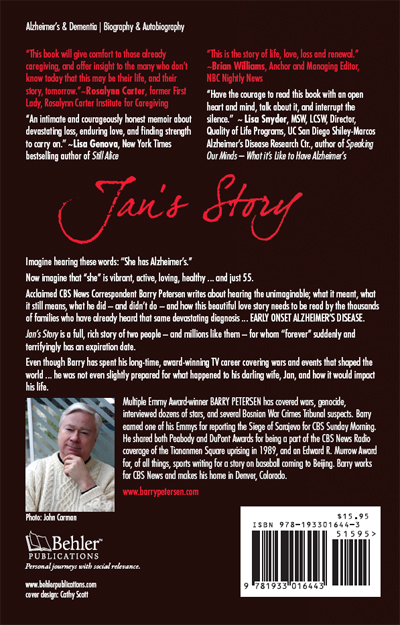Jan's Story (21 page)
Authors: Barry Petersen

Discussion Questions
General
1.  Why do you think Barry wrote this book, especially considering that he said he never intended to write it?
2.  What did you learn about younger-onset Alzheimer's disease that you didn't know before?
3.  Why do you think Barry calls Jan's diagnosis “The Disease” instead of Alzheimer's disease?
4.  Barry made many difficult decisions during the course of Jan's disease.  He predicts, “Some will take heart, some will condemn.” Have you had to make any of these or other difficult decisions?
5.  “Choose life. Celebrate life.” Barry states that this is the most important lesson he learned from Jan during their many years together.  How did Barry draw from Jan's wisdom in order to move forward with his life? What lessons have you learned from challenges in life?
Marriage
1.  Barry unflinchingly describes how Alzheimer's disease affected his marriage, saying, “Being together was the core of our strength. The Disease attacked the core.” How does Alzheimer's disease uniquely affect relationships between life partners?
2.  Did it make sense to you that Barry deeply loves Jan yet found it more and more difficult to be around her as the disease progressed? Do you think it is possible to reconcile these feelings?
3.  What thoughts and feelings did you experience when reading about the way Alzheimer's disease affected intimacy between Barry and Jan? Were you aware of this devastating consequence of the disease?
4.  How did you feel about Barry's response to Jan when she offered intimacy to him one more time? How do you think you would have responded if it was your life partner?
5.  What was your reaction to the suggestions of Barry's friends that he enter into a new relationship? How do you think you would cope with your feelings of guilt while making this decision?
Caregiving and Coping
1.  Barry describes fear, anger, frustration, love, and loneliness as just some of the emotions he experienced as a caregiver. Could you identify with any of these feelings while reading about Barry and Jan's journey? Did you experience any emotions not mentioned in the book?
2.  Uncertainty is identified as one of the worst aspects of Alzheimer's disease.  Why do you think Barry says this? Do you agree, or do you think it would be more difficult to know exactly what was going to happen as the disease progressed?
3.  How did you feel when you read about Barry's rage and how he dealt with it? Could you identify more with his rage or Jan's?
4.  What signs of caregiver stress did Barry show over time, and how did he manage his stress? How would you have dealt with this stress? (For more information, see
http://alz.org/stresscheck
)
5.  Were you surprised by Barry's early escape into “retail therapy” and his subsequent coping mechanisms? Do you engage in these or other coping mechanisms?
6.  Barry said he did not realize he was slipping into a depression until it had reached a dangerous level.  Were you alarmed by Barry's consideration of suicide? What did he cite as his reasons for not following through? Where might one turn for assistance in a similar situation? (For more information, see
http://www.alz.org/we_can_help_24_7_helpline.asp
)
Signs and Symptoms
1.  Barry suggests that “Alzheimer's has immense patience.” What does he mean by this? Do you feel this is a good or bad aspect of the disease?
2.  When describing the years leading up to Jan's diagnosis, Barry asserts that “it was easy not to see it if you started out not wanting to see.” Can you identify with Barry's denial of what was happening?
3.  Jan experienced a difficult 3-day period just before her diagnosis.  What signs did she show during this time? (For more information, see
http://www.alz.org/10signs
)
4.  Barry provides clinical descriptions of the seven stages of Alzheimer's.  How does Jan exhibit symptoms of these stages? Do the symptoms appear in an orderly fashion or do they manifest more chaotically?
5.  What kinds of challenging behaviors did Jan display as the disease progressed? How did Barry and others respond to those behaviors? How have you handled these and other challenging behaviors? (For more information, see
http://www.alz.org/living_with_alzheimers_behaviors.asp
)
Support and Services
1.  What kinds of emotional and social support did Barry benefit from the most? What sources of support would you be able to draw upon in a similar situation? (For more information, see:
http://www.alz.org/we_can_help_we_can_help.asp
)
2.  How did Barry find Jan's live-in caregiver, Diane? If you needed this kind of assistance, how would you go about finding it? (For more information, see
http://www.alz.org/carefinder/index.asp
)
3.  Why did Barry move Jan into an assisted living facility? Do the same reasons apply to every family? What would be your benchmarks to indicate this kind of move was necessary?
4.  Were you surprised at the cost of long term care? How might you prepare for this kind of financial obligation? (For more information, see
http://www.alz.org/living_with_alzheimers_financial_matters.asp
)
This guide was prepared by the Alzheimer's Association
www.alz.org

